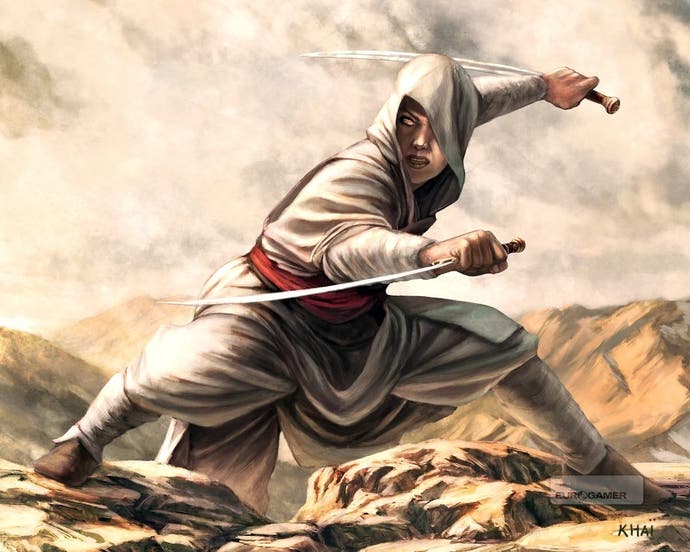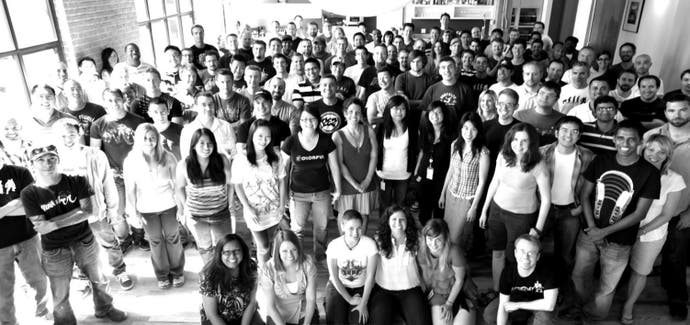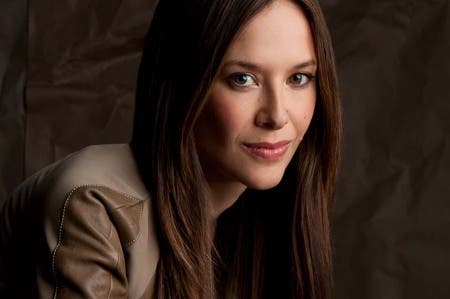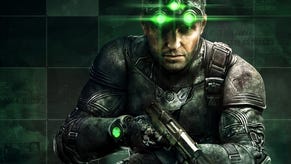Jade's Empire
From the archive: Ubisoft Toronto's first lady Jade Raymond on sexism, robots and why Bobby Kotick should be funding more meaningful games.
Every week we present you an article from our archive - either for you to discover for the first time, or to get reacquainted with. This Sunday, in light of her departure from Ubisoft Toronto, we present Simon Parkin's profile of Jade Raymond, originally published in 2012.
Eight months pregnant with her first daughter, Jade Raymond received a call from her boss requesting she come to work for a meeting. "I knew that Ubisoft was establishing a new studio in Toronto, but I never imagined they would offer me the chance to run it," she says. "I always thought eventually I would like to start my own studio, but presumed it would be farther down the line. So yes, the offer came as something of a shock."
That was two years ago, time that Raymond has spent assembling a team of over 200 staff, many of whom joined her in the move from Ubisoft Montreal to work on the new studio's first announced project, Splinter Cell. For some women, pregnancy is an opportunity to press pause on a career. But for Raymond, childbearing has only served to heighten her passion towards her vocation. As we sit down to talk in San Francisco, she's six months pregnant with her second child. Nevertheless, her opening, impassioned call to arms for developers to find new meaning in games belies that fact just as effectively as her slender frame.
"It's time for our industry to grow up," she says, in a quiet but determined voice. "Why is it that so many topics that are dealt with in other media are off limits or taboo in video games? Why can't we deal with the things that matter? I can think of so many examples of topics that could be interesting, issues that could be addressed in games or that could be integrated into existing big IP if we don't want to make them the centre of the experience. It's our responsibility; doubly so for people like me who can make a difference, or push for something getting funded."

It's Raymond's recent journey into motherhood that has brought about this determination to create games that carry greater meaning. "I am generation X and a parent now, so I don't think I am really the target market for games any more," she says. "We tend to think young people just want explosions. But I don't think it's true. Perhaps even less so than when we were children. I believe we are underestimating our audience by creating the same experience over and over again. We think that this is what they like but I think we are deeply mistaken.
"More and more people come to me at Ubisoft and say, 'I love games. I came into this industry with so many ideas. But I can't continue to make shooters over and over again. I'm not even in line with the messages.' I have that meeting a lot these days. Yeah, it's time to give our teenage medium a kick in the balls."
"I don't know when we decided as an industry that in order to sell five million copies of a game you have to make a Michael Bay film. There are other options."
It's stirring stuff, for sure. But what topics is Raymond interested in exploring through games? "I think it can help to look at what's been big in media over the past 12 months. Interesting topics that have been in the news include the Arab Spring, internet freedom, the growing class divide. I think games could explore religious beliefs in a fascinating way. For example, imagine a game in which death or save games are aligned with the Hindu belief in reincarnation. Perhaps you could retry levels as animals, or humans with different skill sets upon death?
"Beyond that? What about the way the way the system is stacked against the poor? If you lose your job, especially in the States where there's no healthcare, your debt can grow out of control very quickly. It's remarkably easy to become homeless. That meta-gameplay loop could easily be brought into a game I think. Sexism, too. That could easily be brought into a franchise like Call of Duty. If you could play as a woman you could bring in some perspectives to what that might be like.
"I don't know when we decided as an industry that in order to sell five million copies of a game you have to make a Michael Bay film. There are other options."
Raymond has no shortage of ideas and displays a clear hunger to explore topics that have more relevance to players in their 30s and 40s. But surely something has to change at a business level to facilitate this kind of content? Would it be possible to make a blockbuster game about sexism?

"I don't think so," she replies, laughing. "In all honesty I don't think so. I don't think the core of a new blockbuster IP could be about sexism. But listen: you don't necessarily need a whole game to explore that topic. There could be other interesting ways that this theme could be embedded into existing games in a way that is less risky for publishers. The reality of our game industry is that profit margins are narrowing and, if you're making a triple-A title, it has to be a blockbuster hit to make money.
"Everyone is competing for the top slots to be Grand Theft Auto or Modern Warfare or whatever. The current tendency is to copy the games that occupy the top slots, not to try something different. It takes a real belief in the medium for a company to be willing to take the risk. But at the same time, whenever you see a big success it's because somebody took a risk. I am pushing our creative teams to think about meaning and to say something deeper than at the surface level."
"The creative teams who occupy the top spots in our industry should be taking the greatest risks. Activision has the recipe and all of the money. I'm like: 'You guys mess with it a bit!'"
I suggest to Raymond that when blockbuster games take fewer and fewer risks, there can be less and less to differentiate them from one another and this creative stagnation can lead to player ennui. Are we approaching a time when taking risks is, in some ways, the less risky option? "One thing I am certain of," she says, "is that the creative teams who occupy the top spots in our industry should be taking the greatest risks. Activision has the recipe and all of the money. I'm like: 'You guys mess with it a bit!'" She laughs. "I am going to get a phone call from Bobby Kotick now..."
As well as the influence of motherhood, I wonder whether Raymond's interest in exploring deeper themes stems from working in an industry where she has been the target of concerted misogyny from sections of the audience? "You know, there are immature people commenting on everything on the internet. I don't believe it's something that's limited to games. Just look at YouTube comments. You always see the lowest common denominator rising to the top. The anonymity is a part of that problem. Eliminating that can help a lot.
"In terms of working within the industry itself... I always thought developers were particularly intelligent, sensitive and thoughtful people. I haven't had any negative experiences working in the industry regarding sexism."
Raymond is, of course, something of an anomaly, having been promoted to managing director of a huge studio by the time she was 35 years old. It's possible that her experiences working in a male-dominated industry have been the exception, not the rule. But then again, Raymond's own route into the industry was exceptional.
"I had my heart set on joining the game industry," she explains. "I don't come from a wealthy family, so I knew I had to get a good job to be able to pay off my debts, so I figured it would be easier to do that as a programmer rather than, say, an artist. So I was a Computer Science major at university."

"So becoming a programmer was a business decision?" I ask.
"It was partly a business decision," she says, laughing. "But also I was part of this experimental after school programme when I was in Grade 3 [eight years old], where I got to build robots and program them after school. It was just in Logo but it meant that when I was very young I was taking motors and building robots to get them to do different things. There were only three of us in the group so we each got a huge amount of attention. The person leading the group would set us a problem and we would have to build a robot to solve it. That gave me exposure to computers and programming at a very young age which left a lasting impression."
Raymond was lucky. She grew up in the eastern townships outside of Montreal where computer programs such as this were rare. "I think it was probably the brainchild of a teacher who was passionate about technology and started it up off their own back. I don't even know how I was selected. I think maybe I was good at maths and so was brought in because of that. After a while I toured the school board showing off my robots. I think the idea was that we would convince other schools to use the program. But in the end it didn't get funded. Still, it had given me the spark I needed. After that, I would receive second-hand computers from my cousins and would dabble in programming off my own back. I guess in that way I wasn't typical."
"I always thought developers were particularly intelligent, sensitive and thoughtful people. I haven't had any negative experiences working in the industry regarding sexism."
Certainly at the Game Developers Conference, where Raymond and I are talking, the gender split of delegates is far from 50/50, the vast majority of attendees male. I ask Raymond what it is that contributes to this imbalance. "McGill University, where I studied, has been encouraging me recently to go talk to kids in elementary school. Because I think children make choices that send them down a particular track from a very early age. The course subjects you choose when you are a youngster can preclude you from studying Computer Science later down the road, before you actually realise you are making that choice. For many, it's too late. There needs to be some education there.
"Then, personally I've had a lot of good feedback from girls that have found it helpful to see me out there talking about my career in the industry. I think in some sense you don't want to be the only girl in a job and so seeing other girls out there working in the industry helps that perception. You wouldn't think that Assassin's Creed is a particularly female type of game but I was at the core of the team. You know, that team had the highest percentage of women on it of any other project at Ubisoft at the time. Of course, when I was Producer on The Sims there was a very healthy gender balance. That reflected the number of women that play that game I think"
The logic there seems to be that games that appeal to women encourage women to join the industry. With that in mind, I ask Raymond what kind of games we should be making to attract more girls into game-making. "It's not a question of making games specifically for girls," she explains. "You make a good game and it will be played regardless of gender. A good game is a good game. I come from a family of three girls and we would sit around and play tons of games for our NES. I mean, can you say that Super Mario Bros. 3 is made for girls or boys? No, it's more about exposure.

"The truth is that perhaps my sisters and I were the exception because we had a console. Now that's not the case. Games are everywhere. Just as many girls have a Nintendo DS as boys do. That's step one towards thinking about a career in games. Because if you haven't been experienced them growing up, then you don't think that it might offer a career for you. That is changing."
Raymond certainly has every intention of giving her children exposure to video games. "Of course I want my children to play games. And when I say games I mean all types of games: board games, sports; all kinds of stuff. I love playing German boardgames right now - Carcassonne, Settlers of Catan. There's something in German culture where you sit around with your family after dimer and everyone plays together to continue the family time. That's something I want to foster in our family. My daughter's already a big fan of hide and seek so it's in the genes..."
"You make a good game and it will be played regardless of gender. A good game is a good game... I mean, can you say that Super Mario Bros. 3 is made for girls or boys?"
"So I guess we can expect hide and seek in the next Splinter Cell?" I quip.
"Yes," she laughs. "I'll even give you a credit for that."
"And the royalties, please."
Splinter Cell is, of course, the only announced project at Raymond's new studio at the moment. But her intention is to have no fewer than six games in development by the time Sam Fisher's latest ships. "We are currently scaling up to 800 people right now. That's a huge number of staff and you can't have them all working on one game!"
With such generous resources at her fingertips, it seems as though Raymond is in a unique position to put her money where her mouth is with regard to creating more meaningful blockbuster experiences. "Yes, we definitely want to make games that innovate and make a difference. I firmly believe that you can innovate more within an existing franchise; you can take chances because you know you have the base that works. Like with the original Assassin's Creed, we had six ideas for innovation. One or two worked and others didn't. When you try to innovate on all fronts it can be too difficult whereas when you know you have a core part of the game that works, you can play with elements on the periphery. That gives you the luxury of innovating."
Despite Raymond's stirring opening speech, it's telling that she fundamentally views innovation as a "luxury". But with the increased costs of game production and the debilitating financial risks of blockbuster game production, it's understandable.
Despite this caution, Raymond's vision is commendable and inspiring. "Ultimately, if we are not moving things forward then why are we working here? If you're going to create something then you have to go above and beyond what's gone before. It's the only way."















